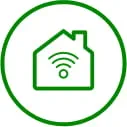In the digital era, a speedy, reliable internet connection is not just a convenience but a lifeline for personal and professional endeavors. The hidden financial costs of a slow internet connection can be substantial, impacting everything from remote work productivity to online shopping. In this blog post, we'll delve into the financial losses associated with a sluggish connection in four particular areas and explore why using fiber-optic internet is the most effective way to battle those losses.
Remote work
With more people working remotely, the financial impact of reduced productivity in remote work due to slow, glitchy internet connections can be significant. Delays in project completion, interrupted virtual meetings and inefficient collaboration can translate into missed deadlines and decreased work output. The cost of such productivity dips for both individuals and businesses can accumulate over time, to the point where it can affect both bottom lines and professional growth.
Online learning
Students investing in online education expect a return on that investment in the form of enhanced knowledge and future opportunities. A slow internet connection can disrupt their learning journey, hindering timely access to educational resources and potentially extending the duration of courses. This not only affects the immediate financial investment but can delay the entry of students into the job market, impacting their earning potential.
E-commerce
For businesses operating in the e-commerce space, a slow internet connection poses a direct threat to revenue. Long loading times on websites can lead to frustrated customers abandoning their shopping carts, resulting in lost sales. In a competitive online market, the financial consequences of such disruptions can be substantial, affecting the profitability and sustainability of e-commerce businesses.
Healthcare
The financial implications of a slow internet connection extend to the healthcare sector, as well. In telemedicine, disruptions in video consultations and compromised data transfer can lead to suboptimal medical advice, requiring patients to see additional medical professions and, of course, pay all additional costs associated with those visits.
Now, let's explore why fiber internet is not just a technological upgrade but a financially savvy choice to eliminate the hidden costs associated with a slow internet connection.
Maximizes productivity for bottom-line growth
Fiber internet delivers unparalleled speed, ensuring minimal downtime and maximum productivity. For businesses, this translates into accelerated project completion, efficient virtual collaboration and ultimately, increased revenue. The initial investment in fiber-optic infrastructure proves to be a financially sound decision as the gains in productivity contribute directly to bottom-line growth.
Reduces costs in education
Students and educational institutions stand to gain financially from the reliability and speed of fiber-optic internet. Reduced latency and uninterrupted access to learning materials contribute to a more efficient learning experience, enabling students to complete courses on time and enter the workforce sooner. This, in turn, minimizes the costs associated with delayed career entry.
Boosts E-commerce revenue
Fiber-optic internet addresses the financial concerns of e-commerce businesses by providing a stable and fast connection. Quick-loading websites and seamless transactions contribute to a positive user experience, reducing the likelihood of abandoned shopping carts and increasing the chances of completing sales. The financial returns from enhanced customer satisfaction and increased conversion rates outweigh the initial investment in fiber-optic infrastructure.
Ensures efficient healthcare services
In the healthcare sector, the financial benefits of fiber-optic internet are evident in the efficient delivery of telemedicine services. Uninterrupted video consultations, secure data transfer and quick access to patient information contribute to effective healthcare delivery, potentially reducing overall healthcare costs and minimizing financial burdens on both providers and patients.
The financial losses associated with a slow internet connection are not just inconveniences but substantial challenges that can impact personal and professional finances. Fiber-optic internet emerges as the financially savvy choice, offering the speed, reliability and scalability needed to eliminate hidden costs and maximize financial returns. In a world where connectivity is synonymous with financial opportunities, investing in fiber-optic internet—whether it’s for commercial or personal reasons— becomes a strategic move to safeguard and enhance your financial well-being.






